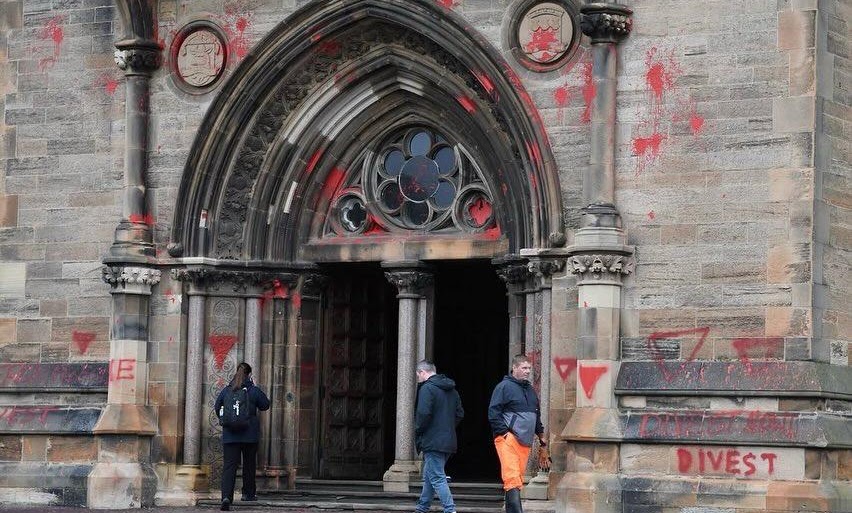Hillhead Review can reveal that the University has spent £9,569.69 + VAT as of 6 August to remove paint from the Gilbert Scott Building following vandalism on 24 June. This equates to £11,483.63, although further costs are likely to incur.
The identity of those responsible remains unknown, and while Glasgow University Justice for Palestine Society (GUJPS) released a statement on the same day, there is no evidence directly linking the society or its members to the incident.
The paint was thrown onto the grade-A listed building on the day of a University Court meeting. In their statement, the GUJPS accused the Court of ignoring calls for divestment, claiming the University’s “profits are covered in Palestinian blood” and declaring that “when every university in Gaza has been obliterated… there can be no business as usual.”
The clean-up cost is nearly double that incurred earlier this year for paint spraying at the JMS building by Youth Demand, a student off-shoot of Just Stop Oil. Hillhead Review can also reveal that, by contrast, graffiti on the Sir Charles Wilson Building was deemed to have caused “no substantial damage,” with the cost of removal covered by the University’s “reactive maintenance budget.”
The clean-up cost is nearly double that incurred earlier this year for paint spraying at the JMS building by Youth Demand, a student off-shoot of Just Stop Oil.
Activism on campus has intensified throughout the year. In March, GUJPS occupied the Sir Charles Wilson Building to demand immediate divestment from arms companies, an end to research partnerships with weapons manufacturers, and immunity for participants in the protest.
Around the same time, members of the society began a hunger strike condemning the University’s investments in companies such as BAE Systems and Thales, arguing that this implicated Glasgow in war crimes in Palestine.
Later that month, GUJPS and Glasgow Against Arms and Fossil Fuels (GAAF), which officially merged at the end of March, blocked University Avenue and occupied campus spaces. Their demands included divestment, a controversial “ban on Zionists and arms companies from campus,” and protections for student activists.
A University spokesperson said: “We do not tolerate criminal activities or those which interfere with the rights of others to go about their business in peace. Where individual students who have damaged property are identified, they will continue to face both arrest by the police and action under the Student Code of Conduct.
“In November last year, the University Court (the governing body of the University of Glasgow) endorsed a revised draft of the University’s Socially Responsible Investment Policy, informed by a consultation exercise with staff and students. The policy covers the University’s endowment fund, which is made up of donations given to the University of Glasgow by benefactors.
“The revised policy strengthens the University’s commitment to socially responsible investment, placing additional requirements on the external fund managers who look after University of Glasgow’s investments. Court considered representations from a student group and campus trade unions.
“However, Court accepted the advice of senior managers that the University should not require fund managers to disinvest, firstly because this could be interpreted as a signal that the University was opposed to the existence of the UK defence sector and secondly in recognition of the University’s ongoing research relationships with a range of firms active in this area.
“We understand and acknowledge the depth of feeling among many of our students on these important issues. We have engaged with our Jewish students and colleagues and the University’s Justice for Palestine Society, and continue to communicate with all relevant student groups to offer assistance, including welfare support.”

Leave a Reply to 📗 ✉️ New Transaction: 1.0 BTC from unknown sender. Review? >> https://graph.org/Get-your-BTC-09-11?hs=ca2a7caab06d828c6a11a2cf00186822& 📗 Cancel reply